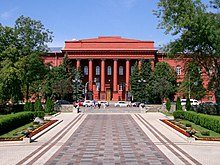Health
Main article: Health in
Ukraine
Ukraine's healthcare system is state subsidised and freely available to all
Ukrainian citizens and registered residents. However, it is not compulsory to be
treated in a state-run hospital as a number of private medical complexes do
exist nationwide. The public
sector employs most healthcare professionals, with those working for private
medical centres typically also retaining their state employment as they are
mandated to provide care at public health facilities on a regular basis.All the country's medical service providers and hospitals are subordinate to the Ministry of Health, which provides oversight and scrutiny of general medical practice as well as being responsible for the day to day administration of the healthcare system. Despite this standards of hygiene and patient-care have fallen.
Hospitals in Ukraine are organised along the same lines as most European nations, according to the regional administrative structure; resultantly most towns have their own hospital (Міська Лікарня) and many also have district hospitals (Районна Лікарня). Larger and more specialised medical complexes tend only to be found in major cities, with some even more specialised units located only in the capital, Kiev. However, all Oblasts have their own network of general hospitals which are able to deal with almost all medical problems and are typically equipped with major trauma centres; such hospitals are called 'regional hospitals' (Обласна Лікарня).
Ukraine currently faces a number of major public health issues, and is considered to be in a demographic crisis due to its high death rate and low birth rate (the current Ukrainian birth rate is 11 births/1,000 population, and the death rate is 16.3 deaths/1,000 population). A factor contributing to the relatively high death is a high mortality rate among working-age males from preventable causes such as alcohol poisoning and smoking. In 2008, the country's population was one of the fastest declining in the world at −5% growth. The UN warned that Ukraine's population could fall by as much as 10 million by 2050 if trends did not improve. In addition to this obesity, systemic high blood pressure and the HIV endemic are all major challenges facing the contemporary Ukrainian healthcare system.
As of March 2009 the Ukrainian government to reforming the health care system, by the creation of a national network of family doctors and improvements in the medical emergency services. former Prime Minister Yulia Tymoshenko put forward (in November 2009) an idea to start introducing a public healthcare system based on health insurance in the spring of 2010.
Education
See also: Education in
Ukraine and List of universities in
Ukraine

The University of Kiev is one of Ukraine's most
important educational institutions
Because of the Soviet Union's emphasis on total access of education for all citizens, which continues today, the literacy rate is an estimated 99.4%. Since 2005, an eleven-year school program has been replaced with a twelve-year one: primary education takes four years to complete (starting at age six), middle education (secondary) takes five years to complete; upper secondary then takes three years. In the 12th grade, students take Government Tests, which are also referred to as school-leaving exams. These tests are later used for university admissions.

Ukraine produces the fourth largest number of post-secondary
graduates in Europe, while being ranked seventh in
population

The National Mining
University in Dnipropetrovsk, one of Ukraine's oldest
professional technical universities
Nowadays higher education is either state funded or private. Students that study at state expense receive a standard scholarship if their average marks at the end-of-term exams and differentiated test is at least 4 (see the 5-point grade system below); this rule may be different in some universities. In the case of all grades being the highest (5), the scholarship is increased by 25%. For most students the level of government subsidy is not sufficient to cover their basic living expenses. Most universities provide subsidized housing for out-of-city students. Also, it is common for libraries to supply required books for all registered students. There are two degrees conferred by Ukrainian universities: the Bachelor's Degree (4 years) and the Master's Degree (5–6th year). These degrees are introduced in accordance with Bologna process, in which Ukraine is taking part. Historically, Specialist's Degree (usually 5 years) is still also granted; it was the only degree awarded by universities in the Soviet times

